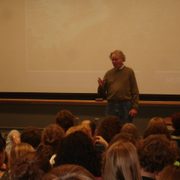-
Hello Carleton! I am excited to begin my work as the Director of the Office of Sustainability! It is an exciting time as we look forward to the next Climate…
-
Professor Camill receives NSF grant to study arctic climate change
Via Carleton News,
“Northfield, Minn.—Phil Camill, associate professor of biology at Carleton College, has received a National Science Foundation grant of more than $400,000 to study climate change in the Canadian Arctic.
Camill, a specialist in global change ecology, will undertake the project with three colleagues: Charles Umbanhower, professor of biology and environmental studies at St. Olaf College, Christoph E. Geiss, associate professor of physics and environmental science at Trinity College (Conn.), and Mark B. Edlund, senior scientist at the Science Museum of Minnesota. The overall project has been funded at $775,000; Camill’s portion of the grant represents the lion’s share at roughly $412,000 for three years of work.
The project’s goal is to improve the scientific understanding of how landscapes (the geographical location of a site, such as being upland or lowland and the abundance of peat-forming wetlands) mediate the responses of lake and terrestrial ecosystems to climate change. The study will look at more than two-dozen sites in the forest-tundra region of northern Manitoba, a region experiencing some of the fastest rates of warming in the world. Warming in Arctic regions is expected to cause large ecosystem changes, including increases in lake productivity, permafrost thaw, shrub expansion, and northward shifts in the sub arctic tree line. However, preliminary work in these sites by Camill and colleagues suggests that landscapes with high abundance of acidic wetlands may alter lake chemistry enough to influence how lakes respond to climate change. The project will test these ideas by examining the relationship between modern lake chemistry and landscape attributes as well as lake and peat land sediments over the past 8,000 years.”
-
Carleton Alum Named to WWF Climate Post
Carleton’s website has a story on Richard Moss ’77 and his new position with the World Wildlife Fund as Vice President and Managing Director for Climate Change in the U.S.
-
Higher Education
1. CU Boulder Works with City to Promote Off-Campus Conservation
2. UNC and NC State Compete to Save Water
3. Furman Receives $1.5 Million Gift Boost Energy Efficiency, Sustainability
National and Internationl News
4. U.N. Chief Seeks More Climate Change Leadership
5. Britain Publishes Climate Change Bill
6. 2007’s word of the year? That would be “locavore”
7. Japan Fleet Sets Off to Hunt Humpbacks
8. From car-borne to carbon
9. OPEC summit to back fight against climate change
10. Emissions pact wins backing: 6 Midwest governors to sign accord
11. China set to beat renewables target – Worldwatch
12. At Wal-Mart, ‘Green’ Has Various Shades: Environmental Push Earns Mixed Results
13. Monkeys rampage in Indian capital14. New Carbon Standard Guarantees Environmental Integrity and Transparency for Global Offset Market
Continue by clicking the “read more” link below
-
Save the World! (In a Computer Game)
Have you ever dream of being a president or prime minister and saving the world?
This Climate Challenge game from the BBC simulates the important decisions the prime minister of the UK will have to make in order to prevent the most catastrophic impacts of climate change. While you are attempting to cut emissions, you also have to manage the country’s economy and maintain political support.
Check out the game here.
How well can you do? Feel free to post your scores in the comments section.
-
Carleton students and faculty members packed the Boliou lecture hall last Wednesday to hear geochemist Wally Broecker deliver a lecture entitled “How to Terminate a Glacial Period.” Dr. Broecker, the Newberry Professor of Earth and Environmental Sciences at Columbia University, described new research that gives insight into the Younger Dryas period, a time of cold climate conditions eleven to twelve thousand years ago. In the ongoing research of global warming, this era serves as a particularly interesting example of a time of rapid climate change, when the thermohaline conveyer of ocean currents suddenly shut down, possibly as a result of the flooding of ancient Lake Agassiz (present day Great Lakes) into the Atlantic Ocean. Dr. Broecker has written that the Younger Dryas “holds the key to understanding abrupt climate change” and thus, merits extensive research given our current situation with global warming.
Continue by clicking the “read more” link below
Categories
- Building and Planning
- Carleton's Wind Turbines
- Climate Change
- Conferences
- Cowling Arboretum
- Ecosystem Management
- Emissions and Offsets
- Energy Sources & Uses
- Environmental Justice
- Events
- Food
- Higher Education
- International News
- National News
- News
- STA Program
- Student Life
- Student Projects
- Sustainability
- Sustainable Planning & Development
- Transportation
- Waste


